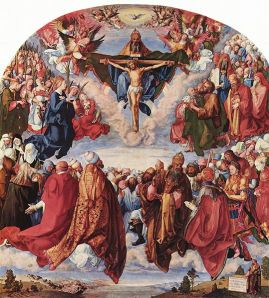Today is the feast of All Saints. For us as gay men, lesbians in the church, this begs the obvious questions: are there gay saints? Does it matter?
Some sources say clearly yes, listing numerous examples. Others dispute the idea, saying either that the examples quoted are not officially recognised, or denying that they wer gay because we do not know that they were sexually active. Before discussing specifically LGBT or queer saints, consider a more general question.
Who are the “Saints”, and why do we recognise them?
 |
| All Saints : Albrecht Dürer |
Richard McBrien gives one response, at
NCR on-line:
There are many more saints in heaven than the relatively few who have been officially recognized by the church.
“For every St. Francis of Assisi or St. Rose of Lima there are thousands of unknown and long forgotten mothers and fathers, sisters and brothers, grandmothers and grandfathers, aunts and uncles, cousins, friends, neighbors, co-workers, nurses, teachers, manual laborers, and other individuals in various kinds of occupations who lived holy lives that were consistent with the values of the Gospel of Jesus Christ.
“Although each is in eternal glory, none of their names is attached to a liturgical feast, a parish church, a pious society, or any other ecclesiastical institution. The catch-all feast that we celebrate next week is all the recognition they're ever going to receive from the church.”
“The church makes saints in order to provide a steady, ever renewable stream of exemplars, or sacraments, of Christ, lest our following of Christ be reduced to some kind of abstract, intellectual exercise.
Two things are important here, especially at this feast of "all" saints: the category of saints is far larger than just those who have been recognised by a formal process; and the reason for giving them honour is to provide role models. It is not inherent to the tradition of honouring the saints that they should be miracle workers, or that we should be praying to them for special favours – although officially attested miracles are part of the canonization process. This formal process did not even exist in the early church: it was only in the 11th or 12 the century that saint making became the exclusive preserve of the Pope.
It now becomes easier to make sense of the gay, lesbian and transvestite saints in Church history, and their importance for the feast of All Saints.

